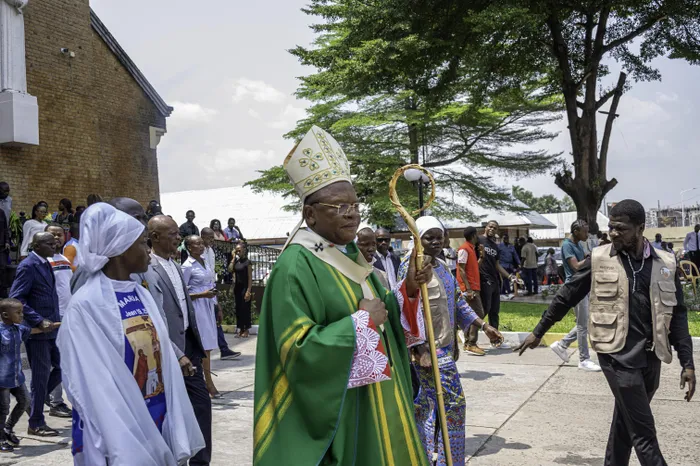Electing a Black Pope a bridge too far for the Vatican?
CATHOLIC CHURCH

Cardinal Fridolin Ambongo walks before the celebration of a Mass organized at the Notre Dame du Congo Cathedral in Kinshasa on February 9, 2025 by Catholic students praying for peace and for those affected by the war in the East of the Democratic Republic of Congo.
Image: AFP
Dr. Sizo Nkala
The death of Pope Francis on April 21, after being at the helm of the Catholic Church as the first Latin American pope for 12 years, immediately sparked a conversation about who his successor would be. As he was being laid to rest in an elegant ceremony on April 26, tongues had already started wagging and names of potential successors were being thrown around.
The process of choosing the new pope – known as the conclave - is set to begin on the 7th of May when the observation of the 9-day mourning period ends as stipulated by the church tradition. A total of 135 cardinals under the age of 80 will be eligible to cast their secret vote for Francis’ successor handing him the authority over 1.4 billion Catholics around the world.
A papal candidate must garner at least two-thirds of the vote to be elected. Cardinals will continue to vote in successive rounds until one of the candidates gets the required threshold. It took five rounds of voting in 2013 for Pope Francis to reach the two-thirds threshold.
The possibility of having the first African pope in modern history has been much discussed in the lead-up to the election of the pope. Boasting 281 million members of the Catholic church representing 20 percent of the entire membership, many feel that it is time for an African pope to signify the changing face of the church.
Pope Francis was very proactive when it came to Africa which had previously been relegated to the margins in the Church. He visited a total of 10 African countries during his reign, increased the share of African cardinals in the Vatican from 8 per cent to 12 per cent and lent his prominent voice in calling for peace in some of Africa’s most conflict-ridden countries including the Central African Republic (CAR), South Sudan, and the Democratic Republic of Congo (DRC).
He once remarkably kissed the feet of Riek Machar and Salva Kiir – the leaders of the warring factions in South Sudan – begging them to smoke the peace pipe. There is a widespread feeling that the appointment of a black Pope may give Africa the much-needed spotlight through the influence of the Church especially now that the United States under Donald Trump seems to be turning its back on the continent.
Further, it has been argued that the Catholic church in Africa is dominated by the youth who are full of energy and zeal and have devoted themselves to the church's doctrines and traditions. An African pope, so the argument goes, may represent the energy necessary to reinvigorate the global church which is becoming increasingly affected by apathy.
Among the African names being thrown around are Cardinals Peter Turkson of Ghana, Robert Sarah of Guinea, and Fridolin Ambongo Besungu of the DRC who have been identified as some of the top African contenders for one of the world’s most influential offices.
While the three cardinals have grown in influence and stature in the Vatican over the years, Cardinal Fridolin seems to be ahead of the other two. His country, the DRC is home to the largest population of Catholics in Africa at 55 million. He is an outspoken critic of the DRC government and was a prominent voice in the rejection of Pope Francis’s decision to allow the Catholic church to bless same-sex marriages.
This is something that may endear him to the conservative and traditionalist voices within the conclave who may not have agreed with Pope Francis’ more liberal approach.
However, the arithmetic does not favour the election of an African candidate as only 18 of the 135 cardinals eligible to vote come from Africa. Europe has the largest voting bloc with 53 cardinals followed by Asia with 23, Latin America has 21, North America has 16 while Oceania has 4 representatives.
With allegations of deep-seated racism having been levelled against the Vatican in the past, it is unlikely that an African candidate will be able to amass the two-thirds majority required for a successful election. Further, as much as Fridolin has an impressive profile, he does not occupy an important or powerful position within the Vatican which is something that may dim his prospects.
Other better-known and more formidable candidates will be in contention such as Mario Grech who is the secretary general of the Synod of Bishops, Pietro Parolin who is effectively the second in command as the secretary of state of the Vatican, and Luis Tagle of the Philippines who is the pro-prefect for the Congregation for the Evangelization of Peoples to mention a few.
The cardinals will look to elect someone with the potential to rescue the Vatican from its current financial and administrative malaise while also matching Pope Francis’s global stature. Nonetheless, whoever is eventually chosen as the next pope cannot afford to ignore Africa where the church is enjoying rapid growth.
* Dr. Sizo Nkala is a Research Fellow at the University of Johannesburg’s Centre for Africa-China Studies.
** The views expressed do not necessarily reflect the views of IOL or Independent Media.